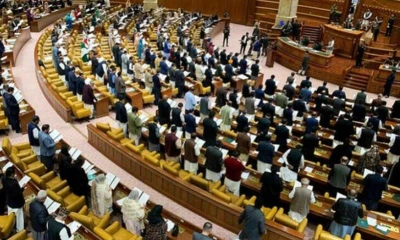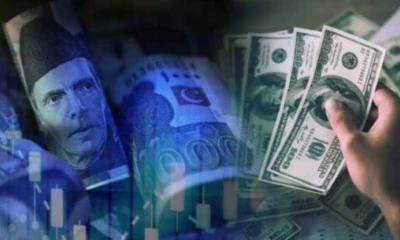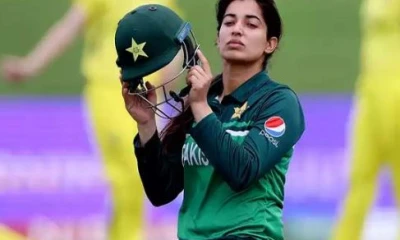-


اعظم سواتی نے عدلیہ کی بے بسی پر سوال اٹھا دیا #gnn #pti #imrankhan #azamswati #nawazsharif #news
-


عمران خان سپریم کورٹ میں پیش #gnn #pti #imrankhan #supremecourt #news #breaking #latest #video
-


Imran Khan First Look in Sea Green Shirt | Imran Khan's Virtual Appearance in Supreme Court | GNN
-


Who Viral Imran Khan First Picture From Supreme Court? | GNN
Sports
Skenes strikes out first seven Cubs, 11 overall
Paul Skenes struck out the first seven Cubs hitters he faced Friday, setting a record for a Pirates pitcher and tying the major league record for a rookie.

On Friday, the rookie struck out the first seven Chicago Cubs hitters he faced during an electric outing at Wrigley Field, his first big league appearance on the road and one that led to a 9-3 Pirates victory.
Skenes, who also faced the Cubs in his major league debut, cited better fastball command for his improvement.
"I had my pitches working for me a lot better than last time," the 21-year-old said. "It's really tough to compete without fastball execution, no matter who you are. It was a lot better today."
Skenes, 21, retired the first 13 batters overall before walking first baseman Michael Busch in the fifth inning. Busch was the only baserunner to reach off Skenes, who pitched six hitless innings on 100 pitches. He struck out 11 overall.
"He went right after them," Pirates manager Derek Shelton said. "He used all of his pitches. The fact that he was able to go back and forth (between pitches) and then go back to the fastball when he needed it -- and when you go back to the fastball and it's 100 mph, it kind of changes the dynamic a little bit."
Skenes' 100th pitch was clocked at 100 mph as he struck out Michael Tauchman for the third time in the game.
"The fastball command was good today," Tauchman said. "And then he was able to tunnel that splitter/sinker -- or whatever he calls it -- off of it. And throw those all competitively. When you're dealing with someone with that velocity and command and they make you make split-second decisions -- he did a good job."
Skenes was asked if he could appreciate the enormity of the moment -- a 6-inning, no-hit, 11-strikeout performance in his first road start at iconic Wrigley.
"That's something I'll appreciate even more the next couple days," he said. "Wrigley is awesome. I heard all about the day games at Wrigley and the vibe here. It was really, really cool."
The Cubs finally broke through with two outs in the seventh inning, as Christopher Morel hit an opposite-field single into right off reliever Carmen Mlodzinski.
Skenes' seven strikeouts to begin a game set a record for a Pirates pitcher and were second most behind Jim Deshaies (eight straight batters in 1986) and Jacob deGrom (eight, 2014) for the longest run by a rookie in MLB history. It also tied the fifth-longest streak to start a game in big league history; the all-time record is nine, shared by Mickey Welch (1884) and Pablo Lopez (2021).
Skenes' 18 strikeouts through the Cubs outings are tied with Nick Maddox (1907) for the most by a Pirates pitcher over his first two career starts.
Skenes threw 12 pitches at 100 mph or faster Friday, while sprinkling in his secondary pitches as part of a dominant performance. He became the fifth rookie pitcher since the mound was extended in 1893 to have 10 strikeouts and no hits allowed in a game.
Afterward, he was reminded that Major League Baseball is supposed to be hard.
"Yeah, that's what they say," he quipped back.
Information from ESPN Stats & Information was used in this report.
Sports
'Shiver up the spine': Leagues weigh betting risks after Porter scandal
Sportsbooks say legal betting allows for greater transparency, but is the new market causing the issues?

The NBA's Adam Silver, the first major U.S. league commissioner to publicly support legalizing betting, told ESPN on Saturday that having regulated sportsbooks handle the betting action -- instead of local bookmakers and offshore gambling sites -- better protects the league's integrity and provides "an improved ability to detect aberrant behavior."
"Still," Silver wrote in an email, "we believe that sports leagues should have more input into the terms and types of bets offered and that further collaboration is needed among industry stakeholders regarding what is appropriate."
On April 17, Silver banned Jontay Porter from the NBA, accusing the former Toronto Raptors player of violating the league's gambling policy. Porter's "cardinal sin," according to Silver, came in a March 20 game against the Sacramento Kings, during which he allegedly limited his participation to impact lucrative bets that were placed on his statistics at multiple sportsbooks. He played just 3 minutes before leaving, citing illness.
The Porter case, which is being reviewed by authorities in both Canada and the U.S., is the first to include formal allegations of manipulation since states began legalizing sports betting. It sent a "shiver up the spine of all the leagues," a professional sports league executive who asked that their name not be used told ESPN.
The sports betting industry says the system is working because illicit activity is being identified, but the leagues and critics wonder if the new market is causing the issues in the first place.
"Everybody is waiting for the big scandal," said Declan Hill, a professor at the University of New Haven who studies international match-fixing. "One of the leagues is going to be hit by some enormous scandal."
IN THE WAKE of the Porter controversy, league and industry sources told ESPN the NBA was angry that sportsbooks allowed such large amounts of money to be wagered on an obscure player. Among the most suspicious bets was an $80,000 six-leg, same-game parlay placed with DraftKings consisting of under bets on Porter's statistics against the Kings that would have won $1.1 million.
The NBA and its partner sportsbooks -- which include FanDuel, DraftKings and BetMGM -- are discussing changes to betting menus to combat future corruption, ESPN previously reported. Those changes could include prohibiting betting on players signed to two-way contracts between the G League and the NBA, like Porter. More extreme measures, such as not allowing bets on the "under" on a player prop, have also been considered.
The other major leagues are also weighing the financial rewards from this new revenue stream against the inherent risks that come with certain bet types and large betting limits.
The NFL has discouraged sportsbook operators from offering betting on events such as missed field goals and penalties. The NHL asks its partner sportsbooks not to offer wagers on statistics that are difficult to determine and could include some subjectivity, such as the over/under on number of hits by a player, and the NCAA has successfully lobbied individual states to ban betting player props involving college athletes.
Since the start of the season, Major League Baseball has been surveying what types of bets are offered on its players and games. MLB commissioner Rob Manfred told the Associated Press Sports Editors that baseball has been paying close attention to prop bets from the beginning, singling out wagering on the first pitch of games as worrisome. A source familiar with MLB's position on the betting market, though, told ESPN that the league's concern is centered as much, if not more, on how much can be wagered on such prop bets.
"Our concerns are with bet limits, too," the source told ESPN. "So, if a bet limit is reasonable on the first pitch of the game, I don't necessarily think we have a huge problem with it. And I think the commissioner would agree with me on that. And I do think at least one of our partners offers betting on the first pitch of the game. We haven't tried to stop that."
But the leagues have input only on what their partner sportsbooks offer, and by limiting betting menus and the size of wagers, sportsbooks say they risk driving customers to their competition -- and possibly to the underground market. Despite legalization, the underground betting market continues to thrive in the U.S., taking in an estimated $63.8 billion in bets in 2022, according to an analysis by industry lobbying group the American Gaming Association.
"Recent events have highlighted the positive impact that regulated sports betting offers both consumers and sports leagues," Jennifer Aguiar, DraftKings' chief compliance officer, said in a statement. "We believe an outright ban of certain player proposition bets in the regulated market would result in those bets being made in, and thereby strengthen, the already robust illegal market."
A sportsbook operating without a license in the U.S. is unlikely to notify authorities if something untoward takes place, according to Chris Soriano, vice president and chief compliance officer for Penn Entertainment, the gaming company that operates ESPN BET. Some of the suspicious betting on Porter props occurred with unlicensed sportsbooks as well, but it was FanDuel and DraftKings that identified the abnormality for integrity monitors. The $80,000 parlay on Porter's stats was not abnormal in size for VIP clientele, industry sources said, but was flagged during DraftKings' review of the spike in interest on Porter under props in the game.
Soriano said the legal market acts as a deterrent, not an incentive, to corruption.
"I don't think the legal market is contributing to [attempted manipulation] at all," Soriano added. "I think the legal market is actually the check on that. If you see people betting at higher limits, it just means there are more eyes on those transactions."
Some states and leagues, however, believe that certain types of bets aren't worth it. When the Ohio Casino Control Commission prohibited the state's sportsbooks from offering prop bets on collegiate athletes, its executive director, Matt Schuler, said sportsbooks that opposed the ban "failed to provide any factual basis to support" the assertion that bettors would gravitate to the illegal market.
"When I get that feedback, whenever I see, 'Oh, we can't do that, they're going to have to go into the black market,' it comes across with the sincerity of a shark being concerned about the welfare of the smaller fish being taken out of its tank," Schuler told ESPN's "Outside the Lines."
Reducing betting limits on some players and games has helped fight attempts at manipulation in international markets. Matthew Trenhaile, a London-based betting industry veteran, has seen such changes to sportbook offerings work in real time. When sportsbooks started receiving data from low-level tennis tournaments around 2012, it created a "window that hadn't existed before to basically bet and fix matches," he says. Sportsbooks responded by lowering betting limits on the low-level matches to disincentivize match-fixers.
"The moment you create the opportunity, people will look to exploit it," Trenhaile said.
Hill agrees with Trenhaile that data from lower-level events should not be distributed to sportsbooks. He says that ideas such as prohibiting some prop bets are "fluffing around the edges" and that federal guidance is required in the fight for the integrity of American sports.
"I think the sports leagues [and] the bookmakers can make more money and profit more if they take the big steps now rather than waiting for that inevitable scandal that is coming down the pipeline," Hill said.
SINCE SILVER FIRST advocated for legalization, he and the NBA have supported a uniform federal structure to oversee the betting market rather than the current state-by-state approach.
Two federal bills aimed at resetting the sports betting industry have been introduced in Congress, one targeting advertising and the other trying to dedicate more funds to treating gambling addiction. But league sources acknowledge that the gambling industry, which opposes federal intervention, has strong influence in Washington, and Congress has not shown much desire to get involved.
"Our concern right now with any increased federal oversight is that you're going to stand in the way of that stakeholder-based communication and that work at the state level that is robust," Joe Maloney, senior vice president of communications for the American Gaming Association, told "Outside the Lines." "Where the federal government can and should step in is working to eliminate the illegal market."
Since legalization, federal authorities have engaged in multiple investigations into illegal sports betting operations, such as the one involving Ippei Mizuhara, the former interpreter for Los Angeles Dodgers star Shohei Ohtani. But the underground betting market has existed since the dawn of American sports, and Hill said cleaning up the legal market should be the top priority.
"You're always going to have the illegal market," he said. "But if you can make the difference clear between the legal and the illegal then you can unhitch American law enforcement to genuinely go after the illegal market. What you're having now is they're effectively offering the same product, just one's in Costa Rica and the other one's down the road from you."
Many believe that it will take a major scandal for Congress to take action.
"The political system always reacts to crisis," Ohio governor Mike DeWine told "Outside the Lines." "At some point, I think it will reach the level where people will demand that Congress get involved."
Schuler agreed, and added that without regulation, sportsbooks have no incentive to cede competitive advantage by reducing their offerings.
"No sportsbook is going to do this on their own," he said.
ESPN Outside the Lines' Ajay Atayee and John Barr contributed to this report.
Pakistan
PM expresses concern over health of Saudi King Salman Bin Abdul Aziz
Prime Minister Shehbaz Sharif highlights the significant role King Salman plays not only as a close friend of Pakistan, but also as the Custodian of the Two Holy Mosques and a revered leader within the Muslim Ummah.

Islamabad: Prime Minister Shehbaz Sharif on Monday expressed his sincere concern over the health of His Majesty King Salman Bin Abdul Aziz of Saudi Arabia.
In a social media post on X, the Prime Minister highlighted the significant role King Salman plays not only as a close friend of Pakistan, but also as the Custodian of the Two Holy Mosques and a revered leader within the Muslim Ummah.
The Prime Minister emphasized that the people of Pakistan stand united in prayer for complete recovery and swift return to his full health.
-

 Technology 1 day ago
Technology 1 day agoThis smart smoker makes barbecuing indoors a breeze
-

 Regional 16 hours ago
Regional 16 hours agoHeatwave: Punjab govt announces seven-day holiday for schools
-
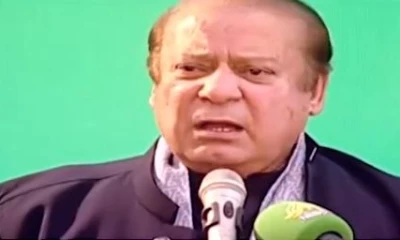
 Pakistan 2 days ago
Pakistan 2 days agoIn PML-N huddle, Nawaz Sharif deplores past 'injustices'
-

 Regional 2 days ago
Regional 2 days agoLahore BISE re-issues schedule for Intermediate exams
-

 Business 2 days ago
Business 2 days agoPrices of gold go extremely high today
-

 Pakistan 1 day ago
Pakistan 1 day agoPakistan Weather Update: Heatwave alert, effects and precautions
-
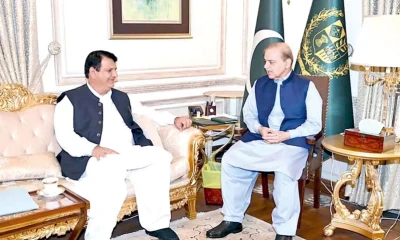
 Pakistan 2 days ago
Pakistan 2 days agoPM directs Amir Muqam to leave for Kyrgyzstan immediately
-
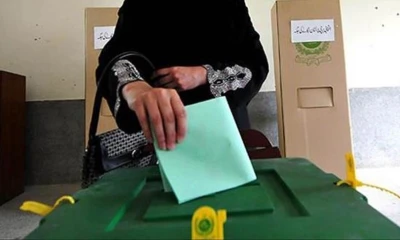
 Pakistan 2 days ago
Pakistan 2 days agoPolling for NA-148 Multan-1 by-election today





